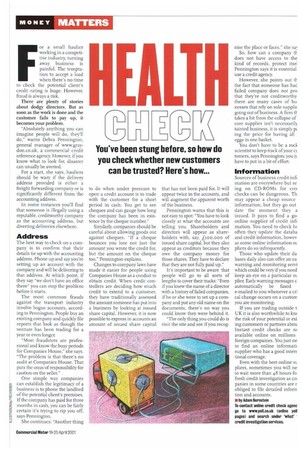F or a small haulier working in a competitive industry, turning
Page 39

If you've noticed an error in this article please click here to report it so we can fix it.
away business is painful. The temptation to accept a load when there's no time to check the potential client's credit rating is huge. However, fraud is always a risk.
There are plenty of stories about dodgy directors. But as soon as the work is done and the customer fails to pay up, it becomes your problem.
"Absolutely anything you can imagine people will do, they'll do," warns Debra Pennington, general manager of www.graydon.co.uk, a commercial credit reference agency. However, if you know what to look for, disaster can usually be averted.
For a start, she says, hauliers should be wary if the delivery address provided is either a freight forwarding company or is significantly different from the accounting address.
In some instances you'll find that someone is illegally using a reputable, creditworthy company as the accounting address, but diverting deliveries elsewhere.
Address
The best way to check on a company is to confirm that their details tie up with the accounting address. Phone up and say you're setting up an account with the company and will be delivering to that address, At which point, if they say "we don't have an office there" you can stop the problem before it starts.
The most common frauds against the transport industry involve bogus accounts, according to Pennington. People buy an existing company and quickly file reports that look as though the venture has been trading for a year or even longer.
"Most fraudsters are professional and know the busy periods for Companies House," she says. "The problem is that there's no audit at Companies House. That puts the onus of responsibility for caution on the seller."
One simple way companies can establish the legitimacy of a business is to phone the landlord of the potential client's premises. lithe company has paid for three months in cash, you can be fairly certain it's trying to rip you off, says Pennington.
She continues: "Another thing to do when under pressure to open a credit account is to trade with the customer for a short period in cash. You get to see cheques and can gauge how long the company has been in existence by the cheque number."
Similarly, companies should be careful about allowing goods out against cheques. "If a cheque bounces you lose not just the amount you wrote the credit for, but the amount on the cheque too," Pennington explains.
Changes to company laws have made it easier for people using Companies House as a conduit to obtain credit. When credit controllers are deciding how much credit to extend to a customer, they have traditionally assessed the amount someone has put into a business by looking at issued share capital. However, it is now possible to express in accounts an amount of issued share capital that has not been paid for. It will appear twice in the accounts, and will augment the apparent worth of the business.
Pennington warns that this is not easy to spot: "You have to look closely at what the accounts are telling you. Shareholders and directors will appear as shareholders with, say, Liao ,000 of issued share capital, but they also appear as creditors because they owe the company money for those shares. They have to declare that they are not frilly paid up."
It's important to be aware that people will go to all sorts of lengths to cover their tracks: "Even if you knew the name of a director with a history of failed companies, if he or she were to set up a company and put any old name on the documents, there's no way you could know they were behind it.
"The only thing you could do is visit the site and see if you recog nise the place or faces," she sa] So, how can a company ft does not have access to the kind of records, protect itsel Pennington says it is essential use a credit agency.
However, she points out tithe fact that someone has haC failed company does not pro that they're not creditworthy. there are many cases of bu nesses that rely on sole supplic going out of business. A firm 0takes a hit from the collapse of core supplier isn't necessarily tainted business, it is simply ing the price for having all eggs in one basket.
You don't have to be a rod scientist to keep track of your u tamers, says Pennington; you ji have to put in a bit of effort.
Information
Sources of business credit inf.( melon are everywhere but re ing on CD-ROMs for cret checks can be dangerous. Th may appear a cheap source information, but they go out date the moment they a issued. It pays to find a go, online supplier of credit infi mation. You need to check in often they update the databa and credit information, howev as some online information se pliers do so infrequently.
Those who update their da bases daily also can offer an ea warning and monitoring servi which could be very if you need keep an eye on a particular se plier. Early warning messages c automatically be faxed e-mailed to you whenever a cri cal change occurs on a custorr you are monitoring.
If you are trading outside t UK it is also worthwhile to kilt the risk of your potential or od ing customers or partners abrot Instant credit checks are nt available online on millions foreign companies. You just ne to find an online informati, supplier who has a good interr tional coverage.
Even with the best online se pliers, sometimes you will ne to wait more than 48 hours fo fresh credit investigation as coi panies in some countries are r obliged to file detailed inform tion and accounts.
• by Adam Bernstein




























































































